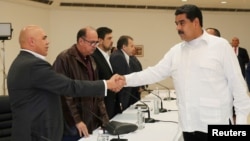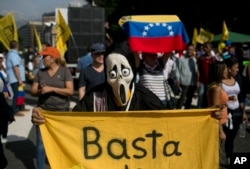Venezuela freed three jailed activists and President Nicolas Maduro's opponents were set to suspend a symbolic trial against him Tuesday as Vatican-sponsored talks appeared to calm the OPEC nation's political crisis.
The 53-year-old socialist leader greeted foes at the weekend talks, but opposition leaders conditioned further dialogue on the release of their estimated 100 political prisoners and a national vote on his rule.
Though the Democratic Unity coalition said three releases were not enough, sources at the opposition-led National Assembly said a political trial of Maduro, due to culminate Tuesday, would be postponed in acknowledgement of progress.
"I congratulate the opposition because they are calming down," Maduro said in a radio show. "What is the alternative to dialogue? War."
Despite the easing of tensions after a frenetic 10 days of protests since the opposition's drive for a recall referendum was quashed, many of Maduro's critics suspect he is using the talks to play for time.
"I don't believe Maduro even when he says 'good morning,' " tweeted opposition leader Henrique Capriles.
Maduro's adversaries accuse him of creating a dictatorship by leaning on compliant institutions to block the recall referendum and sideline the National Assembly.
Stopping the 'persecution'
Authorities freed the three activists — Carlos Melo, Andres Moreno and Marco Trejo — on Monday night.
"I hope this government rethinks and stops the persecution," Melo, 65, who was detained in August and accused of carrying explosives as part of a coup plot, said at a news conference flanked by his wife and supporters.
Moreno and Trejo spent a month in jail, accused of damaging military morale in a political propaganda video that showed a soldier suffering the same economic hardships as protesters.
Senior Socialist Party official Jorge Rodriguez said the releases were "gestures" by tribunals conscious of the dialogue process, but added that investigations of the activists were continuing. They deny the charges, and opposition parties say they were trumped up as part of a wave of repression this year.
Jesus Torrealba, secretary-general of the opposition coalition, said the releases were welcome but not enough, given that scores remained in detention, including well-known opposition leaders Leopoldo Lopez, Antonio Ledezma and Manuel Rosales.
"The releases have to continue. They must give us the recall referendum back, or if not, bring the presidential elections forward," he said.
Venezuela's next presidential election is due in late 2018.
Conspiracies alleged
Maduro, who is struggling to control shortages of consumer goods and soaring prices in an unraveling economy, says he is a victim of opposition conspiracies to overthrow him and of an "economic war" led by businesses with the backing of Washington.
As well as the Vatican, three former heads of state from Panama, the Dominican Republic and Spain plus the regional bloc Unasur are trying to foster dialogue in Venezuela.
Senior U.S. diplomat Tom Shannon is also in Caracas and met with Maduro on Monday to try to support the talks.
Having narrowly won election in 2013 to replace Hugo Chavez, who died of cancer, Maduro has seen his popularity plummet, largely because of the OPEC nation's unprecedented economic crisis.






